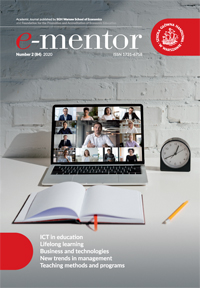Competencies required for teachers in higher education to conduct classes using a strategic business game
Competencies required for teachers in higher education to conduct classes using a strategic business game
Author(s): Anna Wach, Aleksandra GawełSubject(s): Social Sciences, Education, Higher Education
Published by: Szkoła Główna Handlowa w Warszawie, Fundacja Promocji i Akredytacji Kierunków Ekonomicznych
Keywords: methodological competencies; university teacher; constructivism; strategic virtual games; simulation
Summary/Abstract: Contemporary business education should place more emphasis on the development of a proactive attitude among students, engage their creativity in problem solving, shape their analytical competencies and hone their skills related to teamwork, discussion and decision-making. However, this requires the teacher to replace the conventional transmission-based manner of conducting classes with an approach that places the student’s activity at the center. Any shift towards designing educational opportunities and supporting students in the process of constructing their knowledge requires a change in the methodological skills of teachers in higher education. The aim of this article is to present skills related to designing and conducting classes from a constructivist point of view, with the use of strategic business simulation games. The tasks of a teacher using constructivism were examined on the basis of in-depth interviews with university teachers who use business games in their work with students. The present case study shows that when the research participants teach, they create educational opportunities which place their students in problem situations and encourage them to make a series of managerial decisions. They activate the students’ prior knowledge, allow them to make mistakes, stimulate interactions in the process of negotiating the meaning of the reality and support them in realizing the knowledge they acquire. The teachers create a context and immerse the students in running a virtual business, giving them an opportunity to build integrated and holistic knowledge. By giving their students autonomy, they teach them self-reliance and responsibility. It was observed in the analyzed narrations that, apart from a change in tools connected with using a business simulation, there was also a change in thinking about learning and teaching. What is of particular importance in this context is that these changes were accompanied by the teacher’s development and a transformation from someone who based their classes mainly on experience and intuition, into a reflective and conscious educator who not only understands the mechanisms of learning and teaching, but can also name and explain them.
Journal: e-mentor
- Issue Year: 84/2020
- Issue No: 2
- Page Range: 13-21
- Page Count: 9
- Language: English

